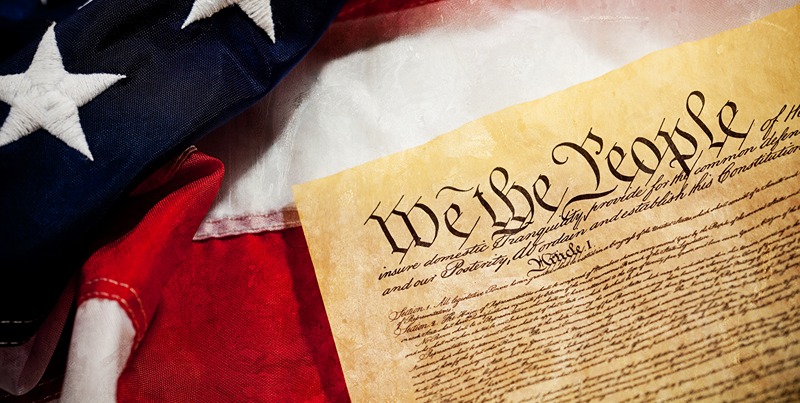Criminal Protections in the Constitution: 4th, 5th, and 6th Amendments

This article discusses the following:
- The 4th Amendment: Protection Against Unreasonable Searches and Seizures
- The 5th Amendment: The Right to Due Process and Protection Against Self-Incrimination
- The 6th Amendment: The Right to a Speedy and Public Trial, and Other Trial Rights
- Exclusionary Rule and Fruit of the Poisonous Tree Doctrine
- Miranda Rights and the 5th Amendment
- Right to Counsel and the 6th Amendment
- Why Hiring a Federal Criminal Defense Attorney Benefits Your 6th Amendment Rights
The United States Constitution provides essential protections for ensuring justice and fairness.
The 4th, 5th, and 6th Amendments are cornerstones of the American justice system, serving as shields for individuals against overreach by federal authorities.
At Kolsrud Law, we emphasize these constitutional guarantees when defending our clients in federal court.
Did you know? A fun fact about the 4th, 5th, and 6th Amendments is that the notorious case of John Lilburne, a 17th-century English political activist influenced them. Lilburne's staunch defense of his right to remain silent during his trials helped shape the principles eventually adopted in these amendments. His legacy earned him the nickname "Freeborn John," his advocacy is reflected in the American legal doctrine that no person should be compelled to testify against themselves, a core principle of the 5th Amendment.

The Fourth Amendment: Protection Against Unreasonable Searches and Seizures
Under the Fourth Amendment, citizens are protected from unreasonable searches and seizures by the government.
This means that federal law enforcement officers must generally obtain a warrant based on probable cause before conducting a search or seizing property.
There are, of course, exceptions to this rule, and understanding the nuances of these exceptions is essential in building a defense strategy.
- Federal agents must provide a judge with sufficient evidence for a warrant.
- Warrants must specify the place to be searched and the items to be seized.
- Unwarranted searches are presumptively unreasonable, though there are specific and well-delineated exceptions.
Contact us today to schedule a
FREE CONSULTATION and learn
how we can help you.
The Fifth Amendment: The Right to Due Process and Protection Against Self-Incrimination
The Fifth Amendment provides two critical rights: due process and the right against self-incrimination.
Due process means the federal government must respect all legal rights owed to a person according to the law. Self-incrimination is avoided by what is popularly known as the "Miranda" rights, reminding individuals that they have the right to remain silent and seek counsel.
- Due process requires fairness through the judicial process.
- The prohibition against self-incrimination allows defendants to refrain from testifying against themselves.

The Sixth Amendment: The Right to a Speedy and Public Trial and Other Trial Rights
The Sixth Amendment provides for additional trial rights, including the right to a speedy and public trial, an impartial jury, notice of the nature and cause of the accusation, the right to confront witnesses, and the right to counsel.
- The right to a speedy trial is designed to limit the length of time a defendant can be held before trial.
- The right to a public trial ensures transparency in proceedings.
- Defendants must be informed of the nature and cause of accusations against them.
Exclusionary Rule and Fruit of the Poisonous Tree Doctrine
Evidence obtained in violation of the 4th Amendment is generally inadmissible in court under the exclusionary rule.
The "fruit of the poisonous tree" doctrine extends this principle to evidence derived from illegally obtained information.
- Illegally obtained evidence must be excluded from the trial.
- Evidence must be suppressed if it is derived from a constitutional violation.]
Hypothetical Scenario: The Case of the Mistaken Address
Imagine a situation where the FBI receives a tip that a suspect, whom we'll call Mr. Smith, is involved in a federal drug trafficking operation. Based on this tip, they quickly put together an affidavit and obtained a warrant to search Mr. Smith's property. However, due to a clerical error, the warrant specifies an incorrect address, which belongs to Mr. Jones, a law-abiding citizen with no connection to Mr. Smith or the drug operation.
The FBI agents execute the search warrant at Mr. Jones’s house. While searching, they discover in Mr. Jones’s basement a cache of illegal firearms, which are unrelated to the drug trafficking case they were investigating. Mr. Jones is arrested and charged with unlawful possession of firearms.
During the pre-trial proceedings, Mr. Jones’s defense attorney filed a motion to suppress the evidence based on the exclusionary rule, arguing that a valid warrant did not support the search of Mr. Jones's property and thus violated the 4th Amendment. The defense asserts that since the search was unlawful, the discovered firearms are inadmissible evidence.
The prosecution, on the other hand, claims that the discovery was incidental and should not be excluded because the agents acted in good faith, believing the warrant to be correct.
However, the judge ruled in favor of the defense, stating that the exclusionary rule applies because the search warrant was for a different property and, therefore, invalid. The firearms, the product of an unconstitutional search, are considered the “fruit of the poisonous tree” and are suppressed, meaning they cannot be used as evidence in the trial against Mr. Jones.
As a result of this ruling, the charges against Mr. Jones are dropped, as the prosecution no longer has sufficient evidence to proceed with the case. This scenario illustrates how the exclusionary rule and the fruit of the poisonous tree doctrine work together to protect individuals from unconstitutional searches and to maintain the integrity of the judicial process.

Miranda Rights and the 5th Amendment
The Miranda warning ensures that individuals understand their right to avoid self-incrimination under the 5th Amendment.
Federal agents must inform individuals of their rights in custody before an interrogation.
- Miranda's rights must be read to individuals in custody before interrogation.
- Statements made without a Miranda warning may be inadmissible.
Hypothetical Scenario: The Overeager Detective
Detective Johnson is investigating a string of federal securities fraud cases. After weeks of surveillance and evidence-gathering, he identifies a suspect, whom we'll call Mr. Grant. Convinced that Mr. Grant is the mastermind behind the fraud, Detective Johnson brings him in for questioning.
Upon arrival at the federal building, Mr. Grant is taken to an interrogation room. Detective Johnson immediately begins questioning Mr. Grant about his alleged involvement in the securities fraud. Mr. Grant, feeling pressured, starts to answer the questions and inadvertently admits to certain illegal activities related to the fraud.
However, in his rush to get a confession, Detective Johnson failed to read Mr. Grant his Miranda rights, which include informing him of his right to remain silent and his right to an attorney.
Mr. Grant’s attorney later learns about the interrogation and files a motion to suppress Mr. Grant’s statements because his client was not read his Miranda rights upon being taken into custody and before being interrogated, which is a violation of his 5th Amendment rights.
The court reviews the circumstances of Mr. Grant's interrogation and finds that indeed, Detective Johnson did not administer the Miranda warning before questioning. Therefore, the court rules that since Mr. Grant was not informed of his right to avoid self-incrimination or his right to counsel, his incriminating statements must be excluded from the evidence against him as they are inadmissible.
This ruling significantly weakens the government's case, and without the inadmissible statements, there may not be enough evidence to proceed to trial. This scenario illustrates the importance of the Miranda warning as a protection against self-incrimination under the 5th Amendment and the potential consequences for law enforcement when this protocol is not followed.
Right to Counsel and the 6th Amendment
The right to counsel is a fundamental component of the 6th Amendment.
This right ensures that defendants have access to legal representation, and if they cannot afford an attorney, one will be provided for them.
- Defendants have the right to be represented by an attorney.
- If a defendant cannot afford an attorney, the court must appoint one.
The 6th Amendment also offers the following additional protections:
- The Right to a Speedy Trial: This right is intended to prevent indefinite incarceration and prolonged anxiety for the accused, as well as to limit the potential for excessive pretrial incarceration.
- The Right to a Public Trial: This ensures that the proceedings are transparent and open to the public, which helps to keep the judicial process honest and accountable.
- The Right to an Impartial Jury: The accused has the right to a trial by an impartial jury of their peers, without any preconceptions or biases that could affect the fairness of the trial.
- The Right to be Informed of the Nature and Cause of the Accusation: Defendants must be informed of the charges against them to prepare an adequate defense.
- The Right to Confront Witnesses: This is also known as the "confrontation clause," which gives the defendant the right to cross-examine all witnesses testifying against them.
- The Right to Compulsory Process: Defendants have the right to compel witnesses to appear in court to testify on their behalf, which is essential to developing a complete defense.
- The Right to an Attorney: If a defendant cannot afford an attorney, one must be provided at no charge. This also encompasses the right to effective counsel, meaning the attorney must be capable of providing a defense.
Hypothetical Scenario: The Case of the Unemployed Chef
Let's consider a case involving Mr. Rivera, a once-renowned chef who has fallen on hard times and is now facing federal embezzlement charges. The charges allege that Mr. Rivera, in a moment of desperation due to unemployment, embezzled funds from a charity event he was volunteering for, which also had federal grants as part of its funding.
When Mr. Rivera appears in court for his arraignment, the judge asks him if he has legal representation. Mr. Rivera, whose financial resources have been depleted due to unemployment, informs the court that he cannot afford an attorney. Acknowledging Mr. Rivera's indigent status, the judge invokes the 6th Amendment's right to counsel.
The judge explains to Mr. Rivera that under the 6th Amendment, he has the right to be represented by an attorney throughout his legal proceedings. Since he cannot afford one, the court must appoint a federal public defender to take his case at no cost.
Mr. Rivera’s court-appointed attorney meets with him to discuss his case, provides legal advice, and begins preparing a defense strategy.
This scenario highlights the essence of the 6th Amendment: no defendant should be left without legal representation in a criminal case due to their financial situation. It underscores the right to a fair trial and the equal treatment of defendants regardless of their economic status.

Why Hiring a Federal Criminal Defense Attorney Benefits Your 6th Amendment Rights
Choosing a private criminal defense attorney over a court-appointed public defender can offer several advantages.
Private attorneys often have lighter caseloads than public defenders, which generally allows them to dedicate more time and resources to each client's case. This increased availability can lead to more personalized and thorough representation.
A private attorney might also bring specialized experience with the specific type of federal crime, offering expertise crucial in navigating complex laws and potentially resulting in more favorable outcomes.
Furthermore, when you hire a private attorney, you can select someone you feel comfortable with, ensuring a working relationship based on trust and confidence. This relationship can be instrumental in building an effective defense strategy.
Private attorneys are driven not only by their duty to their clients but also by the reputation they build in their practice, incentivizing them to strive for the best possible resolutions in each case.
Each aspect of these amendments is critical in the federal criminal defense arena. Understanding and applying these constitutional rights is essential in defending any individual facing federal criminal charges. At Kolsrud Law, we ensure that every client's constitutional protections are vigorously upheld.
Kolsrud Law Offices offers a free consultation to discuss your case, and you can reach them at 480-680-9769.
An award-winning criminal defense attorney Since 2006
Why Choose Josh Kolsrud
With over 100 jury trials to his name, and years of experience as a state and federal prosecutor, Josh understands the law, the legal process, and your rights. Josh is also committed to representing every client with utmost integrity and dedication
Experience
Josh has prosecuted major crimes on the state and federal level, led a successful anti-human sex trafficking operation that saved lives, and argued before countless juries and justices for his clients
Expertise
Josh is an expert in both Arizona and federal criminal law, and is ready to put that expertise to work for you.
Dedication
As a prosecutor, Josh saw far too many defendants lose their livelihood due to poor representation. Josh will always give every client his complete attention and effort
Get a Free Initial Consultation:
Complete our form below to get a free case review.
or call us at (480) 999-9444.
